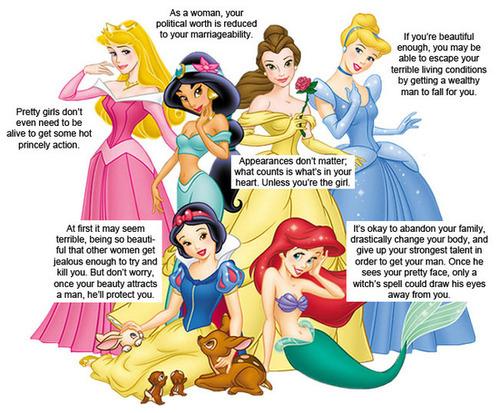Editorial: Disney Princesses Preach Anti-Feminism
Several Disney classics spread restricting women values

Photo by: http://yesterday-tomorrow-and-fantasy.blogspot.com
Disney Princesses have appeared as excellent role models for young ladies. However, looking back at their tales, it’s clear they do not lift up positive messages to young women.
Disney princess films have always been a major part of every little girl’s childhood. Singing that “a dream is a wish your heart makes”, dressing up in fake ball gowns, and most importantly, reciting every word to their favorite princess movie truly takes up a large part of their youth. In this time, they not only play and have fun, they use these female characters as role models. However, although it’s cute to see them curtsy in a poofy dress and sing to random animals, Disney princess films prove to be sexist and anti-feminist.
After recently re-watching all of my favorite Disney princess classics I was exposed to the untrue, traditional messages these films project on to children. Let’s begin with my own personal favorite, Ariel. Wanting to free of her father’s caring and loving protection, Ariel willingly gives up her voice in hopes that her looks alone will persuade handsome Prince Eric to fall in love with her. The evil sea witch Ursula explains how it’s useless to even use a woman’s voice to try and earn a man’s love. She willingly gives up her voice, the only way to communicate, the very thing that makes her who she is for a boy. A boy whom she has only seen ONE TIME. She decides that a man she hardly knows (and who eats her sea creature friends) is more important than her loving supportive friends and family, so she mindlessly accepts a deal that includes leaving them forever. Alas, this Little Mermaid proved to be anything but independent.
Another classic princess that was sadly ruined for me was Sleeping Beauty. Princess Aurora single-handedly proved that you don’t have to talk to find love, hell you don’t even have to be alive to find love! All you have to do is be beautiful. Aurora proved to be one of the more ditsy princesses: Crying because her three guardians (secretly fairies) wouldn’t let her be with some strange, random guy who shows up in the middle of the woods and starts talking to her, and then touching a spindle when she’s been told specifically not to. Her logic is flawed. Another thing that is continuously mentioned within the film is how gorgeous and enchanting she looks. Looks, looks, looks. Which, in the end, is all that matters since the random prince she talked to for five seconds risks his life to kill a vicious dragon and kiss the slumbering beauty. The point of the story: you don’t have to be smart, independent, or even have basic social skills to fall in love. As long as you are pretty and can occasionally break into song all is well.
Snow White demonstrates the more restricting and traditional values set forth for women. Showing how terribly dreadful it is to be so beautiful that your stepmother tries to kill you is one thing; however, her beauty also ends up saving her from the huntsman sent to kill her. Obviously being pretty must not be all that bad. The real damaging message the film Snow White portrays for young women is that you don’t need to be intelligent or independent; no, instead you can just do what you love most and clean and cook for random men. While illustrating an idea that women are only good for making babies, for looking at, cooking, and cleaning, it also portrays a vast amount of ludicrousy. Such as talking to animals. Although the majority of princesses do interact with animals in more humanistic manners, Snow encourages wild animals to be inside the house in your sheets and cleaning your dishes. Sanitary. Although the film was one of the early stories released, it clearly puts women in a domesticated box.
Seeing as there are over a dozen princesses, it would take pages to prod and pick apart each one. I understand that looking so closely at such wonderful and child friendly films seems a tad ridiculous; however, looking at the change over time of Disney princess films, there is a clear shift from anti-feminist to female empowerment. Starting with Mulan, then moving to princess like Tiana from The Princess and the Frog and Elsa from Frozen. So although the anti-feminist analysis seems absurd, it was clear to those in the studios that it is not the proper message to be sending to children. Now, as times are changing, these new movies are sending significantly more positive and empowering messages than those past. However, one does not need to dive into all the logistics and hidden meanings of classic Disney films. They prove to be much more entertaining and uplifting when you just focus on the light story line of a pretty princess being well, a princess.

